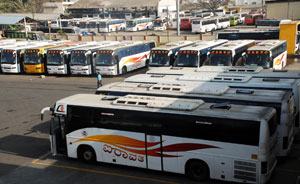Bengaluru, Jul 23: All the seven unions of the state-run transport corporations (STCs) have stuck to their decision to go on an indefinite strike from Sunday midnight as talks with the government failed on Friday.
 Representatives of the unions, including the KSRTC Staff and Workers' Federation (KSWF) and the Akhila Karnataka Rajya Raste Sarige Noukarara Mahamandali, had a two-hour-long discussion with Chief Minister Siddaramaiah and Transport Minister Ramalinga Reddy.
Representatives of the unions, including the KSRTC Staff and Workers' Federation (KSWF) and the Akhila Karnataka Rajya Raste Sarige Noukarara Mahamandali, had a two-hour-long discussion with Chief Minister Siddaramaiah and Transport Minister Ramalinga Reddy.
The leaders of the unions refused to accept Siddaramaiah's offer to enhance the quantum of hike in salary from 8% to 10%. The chief minister appealed to them to give up the strike, but the leaders did not agree.
The government had recently announced a 8% salary hike for employees of the four STCs - KSRTC, BMTC, NEKRTC and NWKRTC. Terming the hike as meagre,' the unions have given a call for an indefinite strike from July 25, demanding enhancement in the hike.
The unions are demanding 35% hike in the salaries. Besides, they have listed 41 various demands including extension of medical benefits to dependents of employees, hike in daily allowance (bata) for drivers and conductors to Rs 300, increase in the repast allowance to at least Rs 100 and opening of subsidised canteen in all depots.
H V Anantha Subbarao, general secretary, KSWF, told Deccan Herald that they had no deliberate intention to cause trouble to lakhs of passengers by keeping around 23,000 buses off the road, but it was inevitable as the government did not fulfil their salary hike demand.
Subbarao said they were ready to hold talks again with the chief minister before Monday and they have told Transport Minister Ramalinga Reddy to persuade Siddaramaiah for another round of talks.
Advance booking continues
The state-run transport corporations (STCs) such as the KSRTC, NEKRTC and NWKRTC have not stopped advance booking of tickets for Monday, despite the strike call.
An official in the KSRTC said booking cannot be stopped because the unions have given a strike call. Amount will be refunded to the passengers in case of a strike, the official said.





Comments
these people need always high salary apart from incentive. Now they are getting good salary and incentive with other benefits like medical, subsidized food in their respective depot canteen so on. But still not happy.
Add new comment